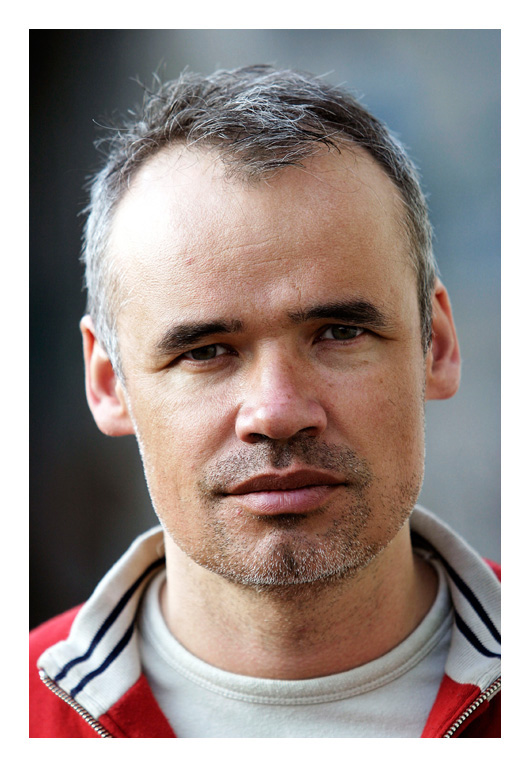o inscenácii
Dea Loher is considered to be a representative of “cool drama“, the style fashionable in the last decades, characterised by increased awareness and artistic consistency with which it expresses the insanity of contemporary world. The Innocence is her latest and probably the most mature play so far. It has almost Shakespearean dimensions: comedy is intermingled with tragedy, sanctity with disgrace, the God with the devil, metaphor with mere word-forwordiness. The basic question is about the problem of guilt and punishment in the present world, where every- thing is upside down.
from the theatre documents
Paweł Miśkiewicz has created a marvellous, impressive production that reflects fundamental questions through common, almost banal stories known from colourful journals or TV news. The style of the staging is on the verge of a grotesque, theatre of absurd and tragedy. The actors interpreting their stories focus rather on the expression of the depth of emotional condition of the characters than on facts. Therefore, the atmosphere on stage is so condensed, exceptional, at first sight completely inadequate for a personal confession of the erotic dancer or petty problems of the post-office employee.
Justyna Nowicka, Rzeczpospolita
Discomfort of the existence in the world, personal dissatisfaction, and inability to preserve anything longer than for a moment are the causes that we ourselves and the world around us create an image of despair. Guilt without guilt as the original sin affects everybody. It sounds seriously. This gravity cannot be completely omitted while watching the performance. However, we often laugh in this theatre. This ambiguity is definitely a strong point of the world created by Dea Loher and Miśkiewicz. The drama of human dissatisfaction emerges from an entertaining form.
(...) No illusion, no identification with the character. A distinct alienating effect is present. However, the structure of theatrical world is so paradoxical that it is impossible to maintain the intellectual perception of alienation – the appalling insight that this artificial world is very real and excruciating often overwhelms the viewer.
(...) A very strange production. Surpassing any classifications. Actually a comedy – laughter can be heard all the time, although it is by far not a matter of laughter. Various theatre genres come along, each fragment is played in a different way: from sitcom to impressive images full of metaphysical depth. A performance depicting the rational contemporary world. However, from the shell of reality emerge strange metaphysical obsessions.
Tadeusz Kornaś, Didaskalia
The controlled madness, set off by Miśkiewicz, is very attractive on the stage, but it is not about the actual collection of the attractions. (...) Controlled madness would not succeed without the actors. It is obvious that they do not just fulfil the instructions given by the director. They are co-authors of the performance. They make a well-co-ordinated team – and at the same time, they are matched as an interesting group of personalities. (...) We do not watch a star show; the art of acting humbly serves the performance that strenuously, overcoming difficulties, creates the world in which, to our surprise, we find optimism. The optimism coming from the very toughness, energy radiated by the actors – and the characters created by them.
Joanna Targoń, Gazeta Wyborcza
The spectator leaves knowing that a great performance about the fight of good and evil, quite unlike Star Wars, could be made. The end of the performance is perverse, but hope, anxiety and the feeling of catharsis win. (...) Miśkiewicz started the 21st century on the Polish stage. This beginning is the search for truth, good, beauty, sanctity, understanding in our giggling and cynical world.
Marek Mikos, Gazeta Wyborcza
creators
directed by Paweł Miśkiewicz
stage designer: Barbara Hanicka
lights: Jacqueline Sobiszewski
video projection: Witold Chomiński
choreography: Tomasz Wygoda
characters and cast:
Elisio: Zbigniew W. Kaleta, Fadoul: Jan Peszek, Absolut: Ewa Kaim, Ms Habersatt: Magda Jarosz, Franz: Piotr Grabowski, Róża: Iwona Budner, Ms Zucker: Iwona Bielska, Ella: Urszula Kiebzak, Helmut: Zbigniew Kosowski, The Mother of killed girl: Agnieszka Mandat, The Father of killed girl: Andrzej Hudziak, Suicide: Michał Czernecki, Girl: Sandra Korzeniak, Boy: Bogdan Brzyski
Bodies: Tomasz Wygoda, Katarzyna Łęcka, Michał Borczuk, Jacek Jabrzyk
director

Paweł Miśkiewicz (1964)
The actor, director, teacher and theatre manager. He studied theatre science at the Jagellonian University, graduated also from the Faculty of Acting and Directing at the State Academy of Performing Arts in Cracow. He started as an actor in the Stary Teatr Theatre, where he played in many performances of Krystian Lupa, Jerzy Jarocki, Tadeusz Malak, Jerzy Grzegorzewski, Krzysztof Warlikowski. Later, as a director, he concentrated on classical dramaturgy (especially 19th and 20th century) and the texts of modern playwrights – both famous and unknown (Beckett, Strindberg, Ibsen, Maciag, Reza, Wedekind, Gombrowicz, Lukosz, Hamsun, Chekhov, Loher...) and he was noticed early by critics as one among the most interesting theatre directors of the nineties. In 2000 – 2003 he was the artis- tic director of the Teatr Polski in Wroclaw, he staged here the Cherry Orchard by Chekhov (Divadelná Nitra 2001). In 1996, he was awarded the Bohdan Korzeniewski Award for the Maids by J. Genet. In 2000 he won the award "Pass-port" for the “Substantial interpretation of the 20th century literature in theatre, original language of art and creativity“ presented by the weekly Polityka. In 2001 the Ministry of Culture presented him the Award for adaptation and direction of the Little Paradise Garden – the degree performance based on six dramas by Tadeusz Różewicz, staged together with the students.
Dea Loher, encouraged by his direction of Klara‘s Relations, entrusted the Polish premiere of the Innocence to Paweł Miśkiewicz.
Materials available
Script of the production: SK, PL
If you are interested in these materials, write to archivy@nitrafest.sk
